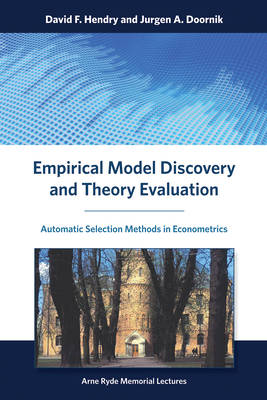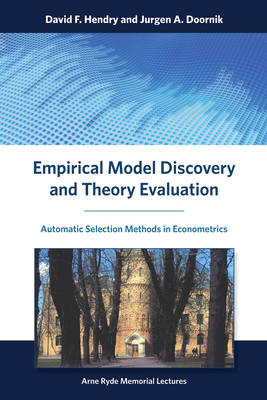
- Retrait gratuit dans votre magasin Club
- 7.000.000 titres dans notre catalogue
- Payer en toute sécurité
- Toujours un magasin près de chez vous
- Retrait gratuit dans votre magasin Club
- 7.000.0000 titres dans notre catalogue
- Payer en toute sécurité
- Toujours un magasin près de chez vous
Empirical Model Discovery and Theory Evaluation
Automatic Selection Methods in Econometrics
David F Hendry, Jurgen A DoornikDescription
Economic models of empirical phenomena are developed for a variety of reasons, the most obvious of which is the numerical characterization of available evidence, in a suitably parsimonious form. Another is to test a theory, or evaluate it against the evidence; still another is to forecast future outcomes. Building such models involves a multitude of decisions, and the large number of features that need to be taken into account can overwhelm the researcher. Automatic model selection, which draws on recent advances in computation and search algorithms, can create, and then empirically investigate, a vastly wider range of possibilities than even the greatest expert. In this book, leading econometricians David Hendry and Jurgen Doornik report on their several decades of innovative research on automatic model selection.
After introducing the principles of empirical model discovery and the role of model selection, Hendry and Doornik outline the stages of developing a viable model of a complicated evolving process. They discuss the discovery stages in detail, considering both the theory of model selection and the performance of several algorithms. They describe extensions to tackling outliers and multiple breaks, leading to the general case of more candidate variables than observations. Finally, they briefly consider selecting models specifically for forecasting.
Spécifications
Parties prenantes
- Auteur(s) :
- Editeur:
Contenu
- Nombre de pages :
- 392
- Langue:
- Anglais
- Collection :
Caractéristiques
- EAN:
- 9780262028356
- Date de parution :
- 03-07-14
- Format:
- Livre relié
- Format numérique:
- Ongenaaid / garenloos gebonden
- Dimensions :
- 158 mm x 236 mm
- Poids :
- 653 g

Les avis
Nous publions uniquement les avis qui respectent les conditions requises. Consultez nos conditions pour les avis.






